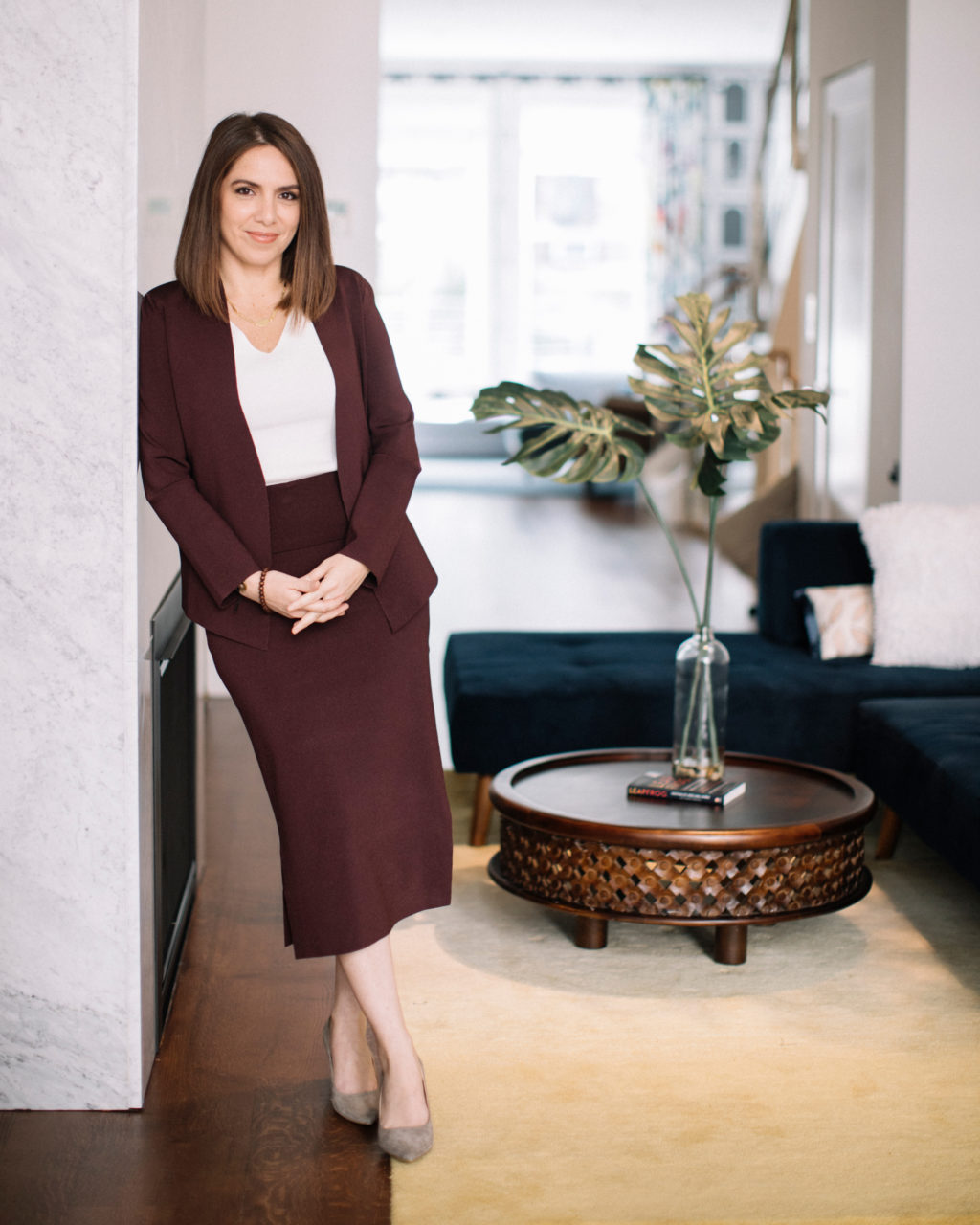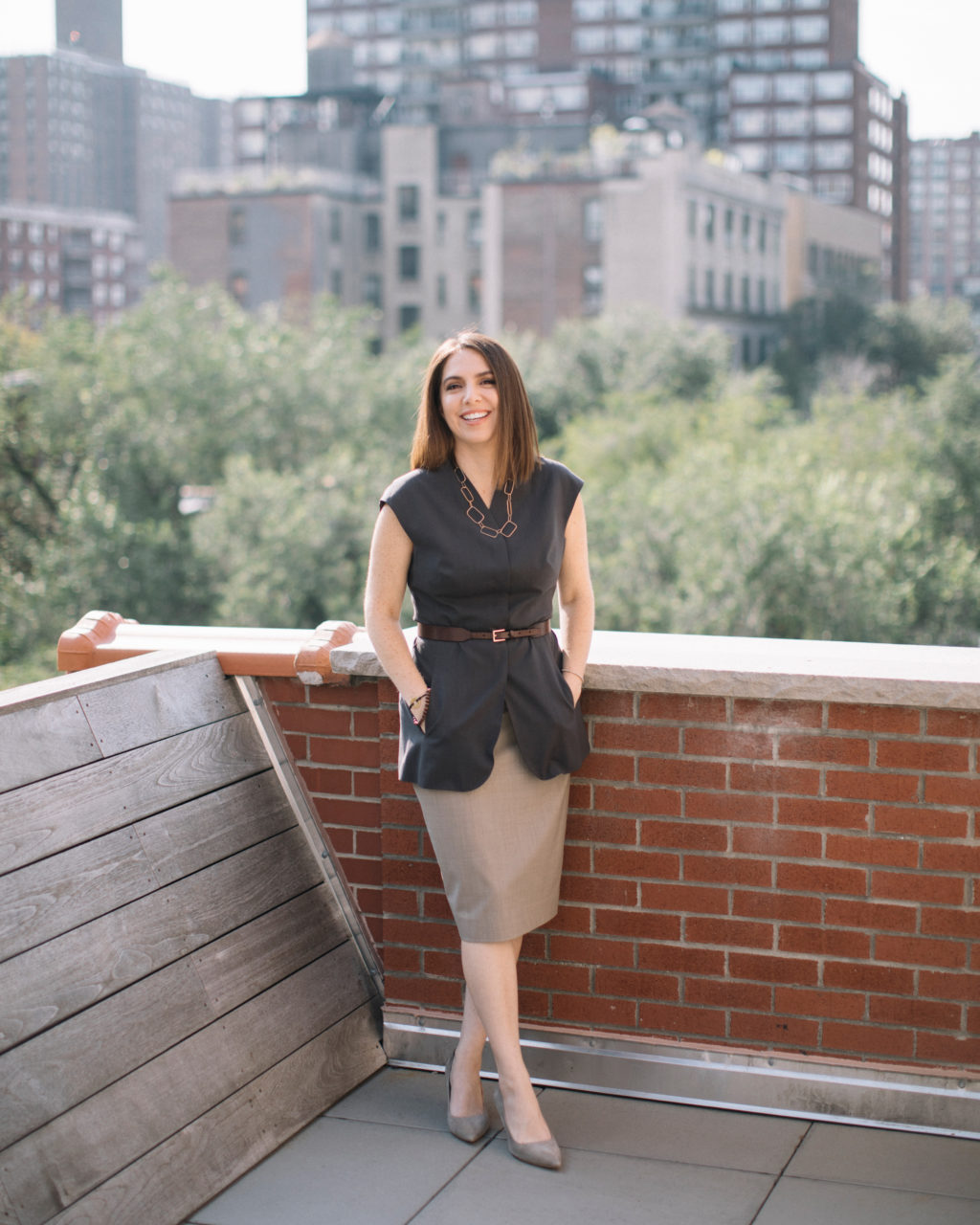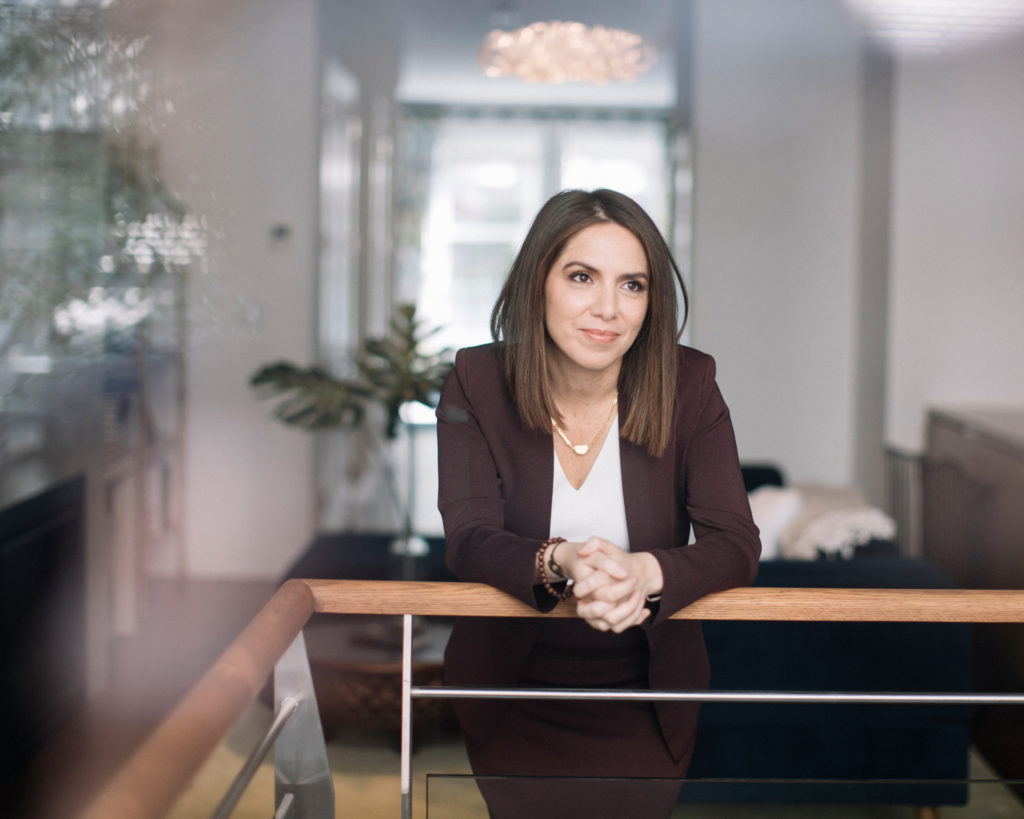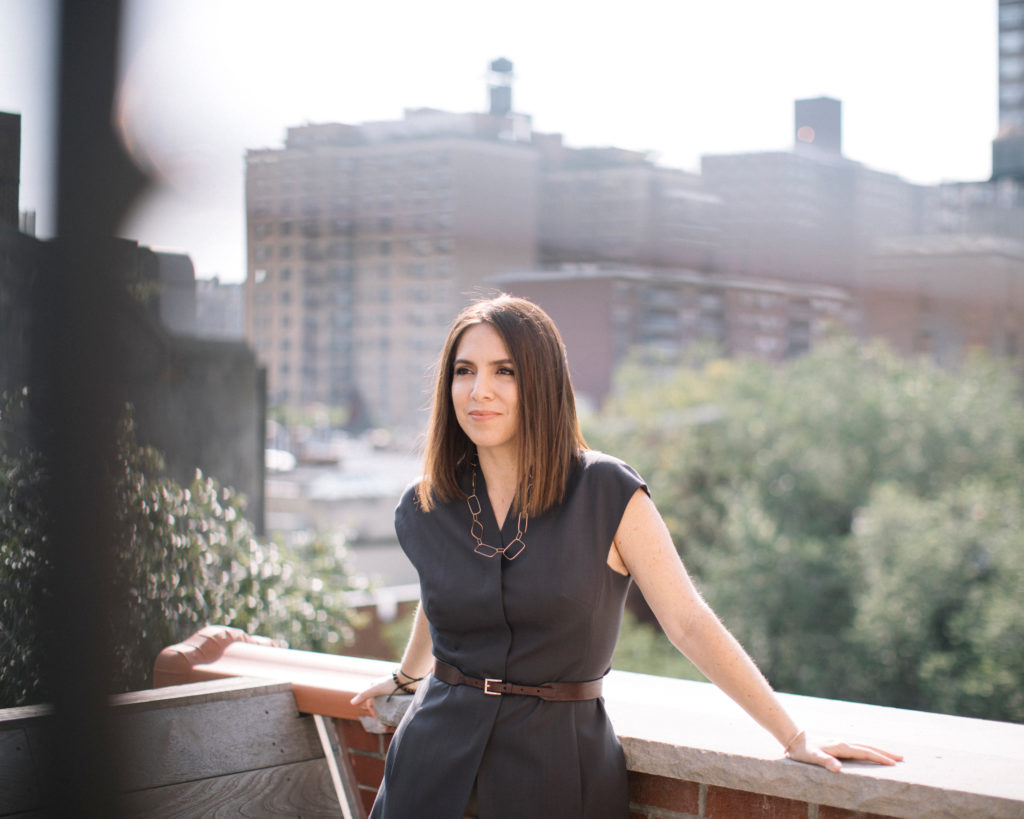Nathalie Molina Niño on Switching Careers in Her Thirties and Finding Her ‘Secret Sauce’
September 14, 2018 | Filed in: Woman of the Week
Nathalie Molina Niño is what you’d call a “serial entrepreneur”: By her mid-thirties, she had already built four companies, having started her first in college. Then, in 2011, she walked away from her 15-year career in tech and began her next chapter—a degree in theater from Columbia. From there, she co-founded Entrepreneurs@Athena, an organization that supports female entrepreneurs through Barnard’s Athena Center for Leadership Studies. Today, she is the CEO of BRAVA Investments, which targets startups that directly benefit women; she also just published her first book, Leapfrog: The New Revolution for Women Entrepreneurs, a collection of fifty “hacks” for start-up founders who don’t have access to old-boys networks or Silicon Valley connections (i.e., most of them, especially women). Here, she discusses breaking the status quo, dropping out of college, and finding her own “secret sauce.”

Nathalie wears the Harlem skirt, the Woolf jardigan, the Peggy top, and the Aradia necklace.
AS AN IMMIGRANT KID, I had the classic experience of belonging nowhere, but I chose to see it as belonging everywhere. When your English is better than your parents’ and you have to navigate the DMV or read the bills when you’re only nine, you learn to be nimble. I learned to manage multiple cultures at once, even at home. My father’s family is from Ecuador and my mother’s family is from Colombia, and although those countries are right next to each other, there are massive cultural differences. There were also class differences between my parents. My mother’s family is very intellectual and political, while my dad’s family was blue collar. Being their daughter and growing up in L.A. taught me to be flexible, think outside the box, and look at situations more objectively—I learned to think, Okay, this behavior is cool here. Not so cool over there.
MY PROFESSIONAL BACKGROUND IS IN TECH GLOBALIZATION. I was in the business of designing software to be culturally appropriate for the different regions of the world where it was sold. Sometimes tiny things, like setting the automatic time zone in Taiwan instead of Beijing—which is something an engineer might do without thinking—could potentially cost a company like Microsoft millions and millions of dollars. My childhood trained me to handle those types of situations and travel smoothly between different societal expectations.

Nathalie wears the Aditi dress and the O’Keeffe sweater.
I DROPPED OUT OF SCHOOL, because I started my first company instead. I went to the University of Colorado in Boulder and studied cartography, which was particularly interesting in the mid-‘90s, when it became possible to use satellite systems to build commercial mapping products like MapQuest. I was a computer geek and also loved art, so cartography combined those interests. But then I found myself in need of a car. I had a motorcycle, but over the holidays I got into a motorcycle wreck in Colombia and busted my knee and my wrist. When I went back to school in January, riding my motorcycle wasn’t an option anymore, but I didn’t have much money, so I went to the dingiest, saddest-looking little car dealership in Boulder, hoping to get a good deal. I found a Jeep Cherokee that was cheap, but I only had half of what they asked for. So I offered to make the dealership a website instead of paying the rest. The owner was happy with it, and then his friend wanted a website too, and a few months later, I had all these clients asking me to make websites for them. So I started a business by accident—literally.
IT WAS A LOT OF WORK TO RUN A GROWING STARTUP and manage school at age 20, and then a third element came into play, which was that I got cervical cancer. I think I probably could have juggled school and the business, but school and the business and being sick was more than a mere mortal, or at least this mere mortal, could handle. I couldn’t do anything about the cancer, but I was more excited about the business than I was about school, so I dropped out.
EVENTUALLY, I EXITED MY COMPANY and went to work with one of my clients, which is how I got into global technology. That client worked with companies like Dell and Hewlett-Packard, translating their software into different languages. After learning the ropes, I then co-launched a similar business for their largest competitor, based in Seattle. From there, I helped build four more companies in the span of 11 years, and then I retired from tech in 2011. I moved to New York and thought, I had a good run. I was exhausted, so I decided to take a few years off. I wanted to take some “me” time, get healthy, and figure out this work-life balance thing that I had never really understood.

Nathalie wears the Harper top, the Cobble Hill skirt, the Strap Belt, and the Europa necklace.
IN MY MID-THIRTIES, I WENT BACK TO SCHOOL, AND STUDIED PLAYWRITING at Columbia. I think part of why I was a good student was that I didn’t give a rat’s ass how I was being evaluated. I was there to have fun and take care of myself, and there’s something to be said for how well you perform when you’re cutting yourself slack and focusing on finding the joy in everything.
MY COLLEAGUES IN TECH all talk about my years at Columbia like, “She fell and bumped her head,” or, “She ran away with the theater circus, and we don’t know what happened to her.” They thought I was going through some weird crisis. At the time, I was one of a handful of experts in the world who knew about the business of computational linguistics, machine learning, and natural language programming, and they thought I was insane to walk away from tech. I was definitely worried about it, too. I had the immigrant mindset of, You can’t leave a perfectly good gig here. You can’t just jump if you don’t know where you’re going to land. And then my health actually forced the decision. I had full adrenal failure, and my immune system was shot from lots of travel and stress. I had to stop and step back.

Nathalie wears the Harlem skirt, the Woolf jardigan, the Peggy top, and the Aradia necklace.
AT THE END OF MY TECH CAREER, I TOOK A HARD LOOK AT MY SKILL SET. I knew that the business of globalization was something I could do well. But when I looked at the big picture, there were plenty of other engineers and technologists who knew what I knew or could learn what I learned, and do it even better than I could. What was the secret sauce that made me uniquely successful, and would position me to succeed in the future? I found that it was storytelling. There were engineers who could code circles around me, but I was always the person who could explain complex concepts to anyone. I was good at creating narratives, and I loved doing it.
FOR MOST PEOPLE, YOUR SECRET SAUCE TRANSCENDS YOUR JOB. For me, storytelling is the connective tissue. It might not seem logical that I left my career in technology to go and study theater. But when you look at the storytelling aspect, it makes sense. I wanted to go study with people who are much, much better at storytelling than I am so that I could take this craft and elevate it. And now, that’s what makes me a strong investor. I invest in companies who want me to help craft their stories.
IF YOU ARE BURNT OUT AND WANT TO MAKE A CAREER CHANGE but don’t know what to do, you need to sit with yourself and say, “I am not my engineering skills,” or, “I am not my marketing skills,” or, “I am not my technical, professional skills.” You are this other, bigger thing, and you can probably parlay it into a different career or a different job if you understand it well enough, and realize that it’s the differentiator between you and someone whose résumé looks a lot like yours.

Nathalie wears the Aditi dress, the O’Keeffe sweater, and the Heritage belt.
CREATIVITY IS NOT MAGIC. I went to a writer’s workshop a few years ago and there was a lesson on writer’s block, but it was only two sentences long. The teacher said, “There’s no such thing as writer’s block. Plumbers don’t get plumber’s block.” Instead, you have to prepare yourself to exercise your creativity like a muscle, and set up rituals around it. I’m a big fan of Twyla Tharp’s book, The Creative Habit, and I love the idea of using the word “ritual” instead of “routine.” Routines sound boring, whereas rituals feel interesting and fun. One of my rituals is that I block my mornings before 10:00 A.M., and I won’t do business before then. That’s when I meditate and walk my dog. I do that every day. It’s about getting my head right—and trying to be as much like Twyla Tharp as possible, because who wouldn’t want that?
I ALSO BELIEVE IN GIVING YOURSELF DAILY VACATIONS. If you’re an entrepreneur, or even if you’re just ambitious, you probably don’t cut yourself a lot of slack. The voice in your head is probably hard on you. So I give myself little moments of “time off.” If I’m downtown and I have a meeting cancellation, I could easily fill that hour with more productivity. But instead, if I haven’t given myself a break that day, I’ll go get a 45-minute foot massage at one of those pedicure places. If I’m not proactive in taking care of myself, my body will make me stop, in an extreme way, by getting sick.

Nathalie wears the Harper top, the Strap Belt, and the Europa necklace.
I KNOW THAT I AM PREDISPOSED TO BEING PERCEIVED AS A LEADER. I’m an extrovert, I’m good at public speaking, and I have other qualities that make people look to me when decisions need to get made. But there are certain leadership skills that I do not have. For example, a lot of people assume that I’m good at managing people, but I’m not. In fact, whenever I build teams, one of the first hires I make is a good manager—a person who has the patience to sit with an executive who’s mad that Susie got the corner office or whatever. I have zero patience for that kind of silliness, and the poor employee who comes to me with that beef will not be happy with my response. A good manager will say, “I hear you. Let’s see what we can do to solve this problem.” It took me a while to recognize that.
I WROTE MY BOOK because I wanted to tell stories that reflect the reality of most people. Female entrepreneurs are not niche. Women are starting more companies than anybody else. Women who work in traditional corporate settings often have side hustles, whether it’s designing jewelry and selling it on Etsy or something else. Entrepreneurship is just another creative muscle, and it can make you stronger at your day job. My book offers tools for the many entrepreneurs who don’t have the status-quo connections and backing that you typically hear about in Silicon Valley.
Photographs by Rich Gilligan.





